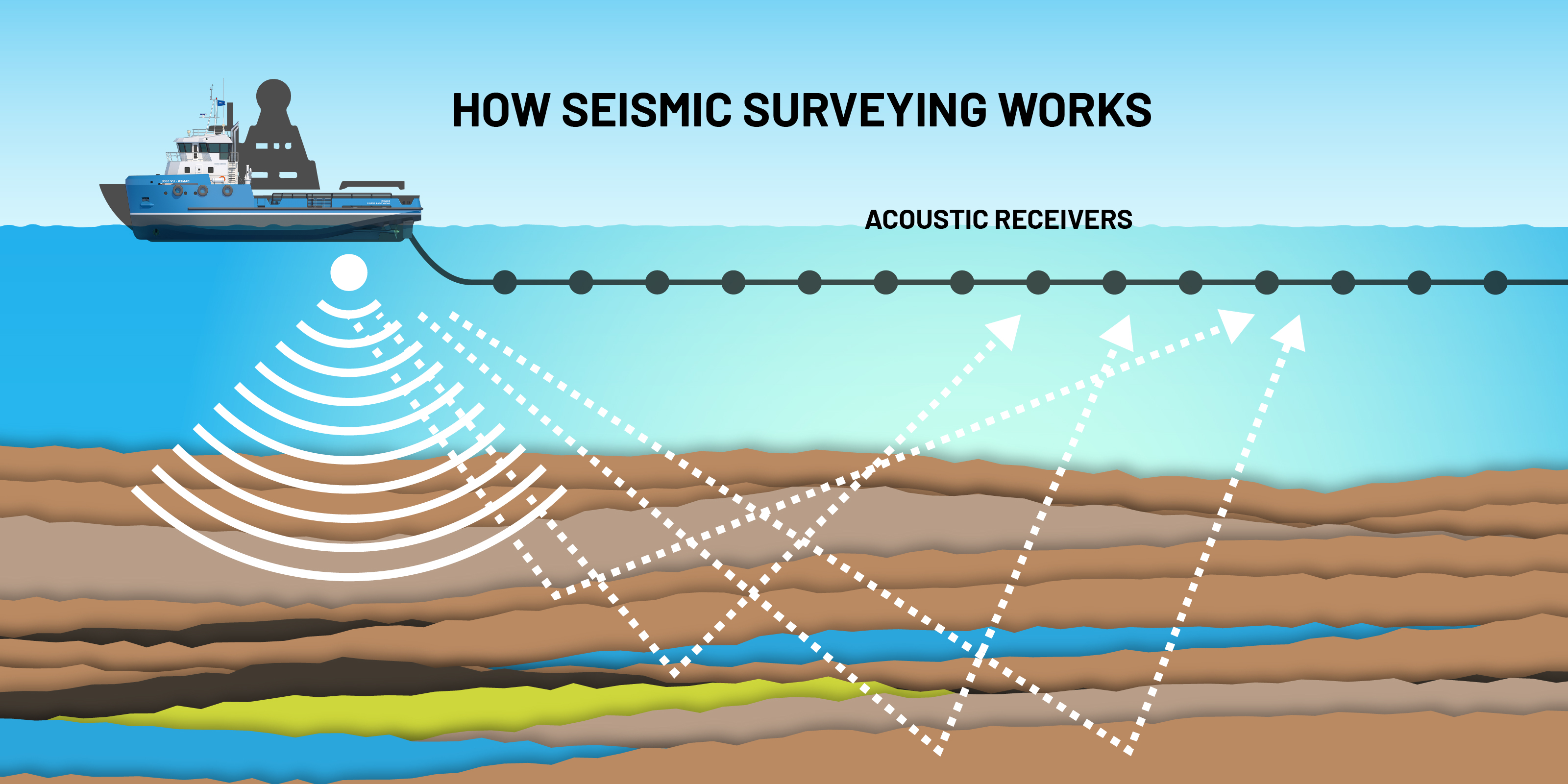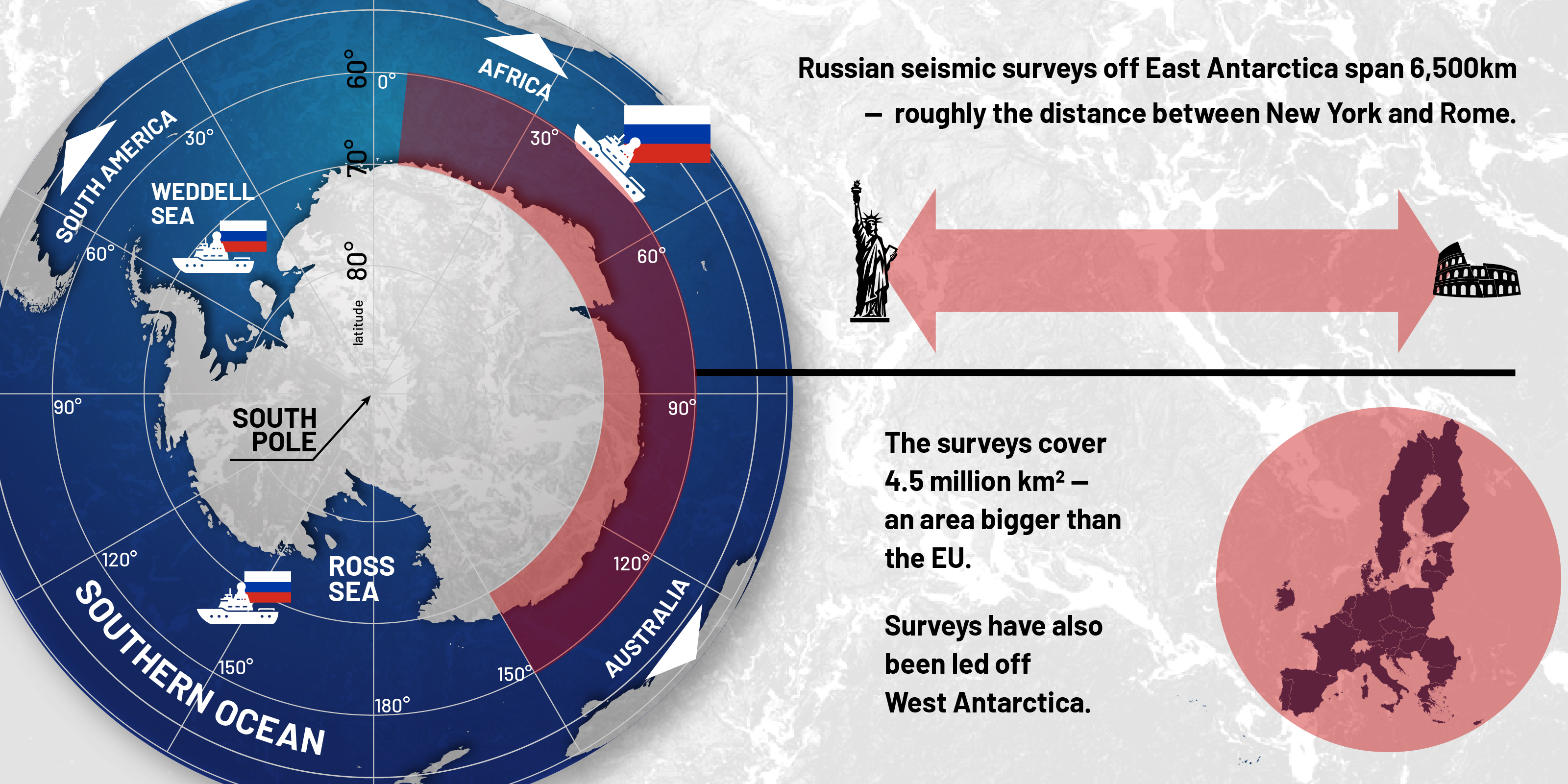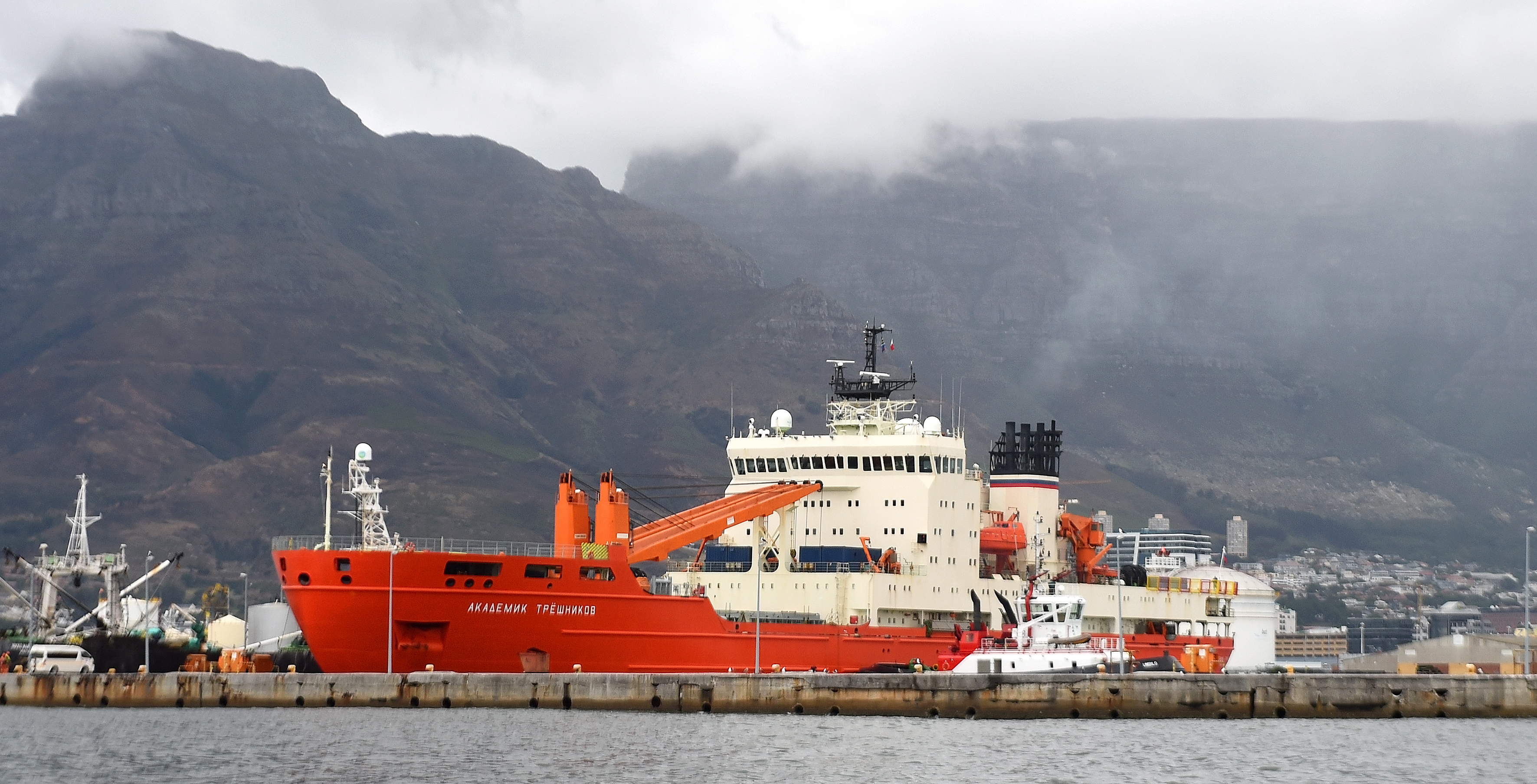Supergiant oilfields are simmering below the Southern Ocean, the warming waters at the bottom of the Earth that wrap around the melting, icy Antarctic, a litany of Kremlin sources suggest.
Despite the 1998 Antarctic mining ban — ratified by Russia and 28 other states — some of the so-called loot in the Kremlin’s crosshairs appears cached within large marine sedimentary basins off East Antarctica’s Indian Ocean sector.
That supposed loot may equal a climate-busting 500 billion barrels of hydrocarbon “resources” — the building blocks for oil and gas — claims a bombshell statement released by the Kremlin’s mineral explorer, Rosgeo.
Issued February 2020 from the Antarctic gateway port of Cape Town, and first reported by S&P Global, the statement hardly cracked a nod in media swamped by pandemic news. Yet, its revelations were staggering — it did not say how much of those stocks were recoverable, but at 500 billion barrels such largesse would outstrip global annual oil consumption of 35 billion barrels by about 15 times.
Rosgeo brazenly revealed its 2020 seismic operations sought “to assess the oil- and gas-bearing prospects of the Antarctic shelf”. Chief geologist Sergey Kozlov predicted data from that year, succeeding 2019 work, would “make it possible to substantially clarify our expectations”.
Yet, refuting those February 2020 media claims that 2019 and 2020 marked Russia’s first attempts since the 1990s to size up Antarctic hydrocarbons, the truth seems more chilling. Instead, Daily Maverick’s investigation into state documents shows Russia has not ceased its search for Far South’s oil, gas and other mineral swag since the late-1990s mining ban entered into force under the Antarctic Treaty’s Madrid Protocol — the environmental chapter that governs the ban.
In 2021/22’s austral summer, it was indeed a Russian prospecting company that once again sailed south on a Kremlin-decreed mission to amass “an information base” on “the mineral resource potential of the Antarctic”.
According to the prospecting company's 2021 annual report, its upcoming operations in the first quarter of this year would probe West Antarctica’s Weddell Sea — where the wreck of Sir Ernest Shackleton’s sunken Endurance vessel was found this season; and proclaiming marine protected areas has failed since 2016, largely due to Chinese and Russian opposition.
That prospecting company is the Saint Petersburg-based Polar Marine Geosurvey Expedition (PMGE), a privatised subsidiary of state-owned Rosgeo — Russia’s largest mineral exploration holding company.
In recent February diaries, the Arctic and Antarctic Research Institute (AARI) — Russia’s polar science operator — confirms seismic surveys were completed on continental East Antarctica, as well as aboard the Russian seismic vessel Professor Logachev, during the 2021/22 summer.
 By emitting and decoding sound blasts that bounce off the seabed, a range of sciences use seismic vessels to understand the ocean floor’s structure and contents. But seismic tech is also used by fossil fuel interests to find oil and gas.
By emitting and decoding sound blasts that bounce off the seabed, a range of sciences use seismic vessels to understand the ocean floor’s structure and contents. But seismic tech is also used by fossil fuel interests to find oil and gas.
Set to gather in Berlin next week for their first annual in-person meeting since the pandemic, the treaty’s 54 states aim to preserve the ecologically sensitive region below 60°S for peaceful activities, particularly tourism and science. Founding signatories Russia and the US reserve the right to claim the whole continent, while competing narratives allege either western states or Russia found Antarctica in 1820 — still, for now, the ban keeps all mining off limits.
This ensures an ice and ocean wilderness nearly five times bigger than Australia belongs to no one.
It is Earth’s last unmined frontier.
But Russian state policy suggests the Kremlin’s designs on this inhospitable St Nowhere — the planet’s coldest and stormiest natural reserve — may transgress the Madrid Protocol’s scientific mandate. In fact, multiple bodies reporting to the Kremlin appear to sing from the same songbook — one that follows high-policy geopolitical orders. As one senior Russian analyst, who was not authorised to speak publicly, told us: “It is approved from the top until the Kremlin says ‘nyet’.”
Geopolitical interests
Chief among Antarctic state documents is Russia’s grand vision for the White Continent and surrounds to 2030: According to that vision's 2021-released action plan, it is a major objective to scrutinise the region’s “geological structure and minerals” by land, air and sea.
Charged with executing these orders are state entities Rosgeo; AARI, the Russian polar science operator; hydro/environment agency Roshydromet; and mineral resource agency Rosnedra.
To further safeguard geopolitical interests, the Kremlin’s "Reproduction and use of natural resources" programme emphasises reliance on Antarctic geology data. This 660-billion roubles (US$10-billion) drive to 2024 is steered by the natural resources ministry. At least seven state bodies are listed as programme participants.
In the 16-year stretch between 2006 and 2022, Russian state-contracted investigations are also weighted with commercial suggestions of Antarctica’s “raw material potential”, often crowing about “promising” oilfields in marine sedimentary basins.
Kremlin interests since the 1998 ban stretch back to at least the early 2000s: The state-run Russian Antarctic Expedition’s 2001 environmental impact assessment (EIA) — an exercise meant to contain damage rather than encourage it — greenlights annual ocean studies of “oil gas-bearing perspectives” via Cape Town, a well-established Russian gateway to Far South. South African Antarctic and environmental authorities did not respond to repeated requests for comment.
At the time of publication, a considerable inventory of Antarctica’s continental minerals was also available, mostly in Russian, on the prospecting company’s website.
This resource described 2.5 million km² “in the exposed mountainous regions of coastal Antarctica” facing the Indian Ocean, citing “manifestations” of gold, diamonds, copper-nickel, coal, iron ore, molybdenum and even uranium. It credited the company’s geologists for doing “a lot” to evaluate these potential resources, such as the so-called “raw materials” of Larsemann Hills — a vault of globally rare minerals that is relatively easy to study because the area is mostly ice-free. A 40km² lake-rich oasis, Larsemann Hills is depicted in none other than Russia’s 2001 Antarctic EIA as one of the “most promising areas” for “mineral and hydrocarbon raw materials” in East Antarctica.
Annually between 2007 and 2017, the company often reports making a move on this very area — where Russia maintains a key logistics and research station, Progress — to assess its “mineral resource potential”.
And deep within the East Antarctic hinterland, war-sanctioned oligarch Leonid Mikhelson, the Putin-aligned chair of gas giant Novatek, has promised to sink 4-billion roubles into building Russia’s flagship new Vostok research station — but only for philanthropic purposes, say Russian media. New modules for that station sailed via Cape Town in October.
Antarctica is “a potential reserve for the extraction of mineral raw materials by future generations of humankind”, divulges a 2015 PMGE report — while a 2017 report also gamely admits Russia’s mineral investigations are “geopolitical”. This “guarantees Russia’s full participation in any form of possible future development of Antarctic mineral resources”. And, this is why “the Russian Federation receives information on the mineragenic potential” of the continent, and “the oil and gas potential of the seas awashing it”.
 Russian seismic surveys in Earth’s last unmined frontier since Antarctica’s 1998 mining ban entered into force. (Graphic: Righard Kapp)
Russian seismic surveys in Earth’s last unmined frontier since Antarctica’s 1998 mining ban entered into force. (Graphic: Righard Kapp)
Russia’s natural resources and foreign affairs ministries did not respond to repeated requests for comment. Rosgeo, replying on behalf of itself and PMGE, said its Antarctic activities were “exclusively scientific” — “without going beyond the standard boundaries of non-commercial geology”. It was in “no way engaged in the exploration and exploitation of Antarctic mineral resources”.
“The purpose of our scientific research is the geological and geophysical study” of Antarctica’s structure and origin, the state’s mineral explorer added. “Marine works are aimed at studying the structure and thickness of the sedimentary cover, determining the nature of the foundation” and “reconstructing the stages of the formation of the Earth’s crust in the Antarctic seas”.
When pointed to a late April report by PMGE, in which the company claimed to be gathering data on Antarctica’s “mineral resource potential”, Rosgeo told us: “You will agree it would be illogical to exclude hydrocarbons from consideration … given that they are a natural component of the geological environment.”
PMGE managing director Pavel Lunev said the company’s geological and geophysical survey work was “no different from the work conducted by other members” signed up to Antarctica’s mining laws. During the 2021/22 summer, he said, the company’s work probed “the glacial processes, dynamics and evolution of the ice sheet and the stages of Antarctic glaciation” and “the nature and foundation of the Earth’s crust”.
‘Prospecting’ through ‘scientific research’
As defined by a controversial 1988 Antarctic mining pact — ultimately abandoned after public protests — “prospecting” aims to identify “areas of mineral resource potential for possible exploration and development”.
Thus, argued the University of Canterbury’s Alan Hemmings, Antarctic prospecting was a mineral resource activity outlawed by the ban, because it forbade “any activity relating to mineral resources, excluding scientific research”. Hemmings, an observer of the 1990s ban negotiations, added “parties had earlier agreed that prospecting was the first of three stages of mineral resource activities — and quite separate from scientific research activities”.
PMGE’s advertised services include analysing the Earth’s crust — a geology discipline permitted by the ban’s “scientific research” allowance. None of this means prospecting should be “laundered” as standard geology, or any of myriad sciences allowed by the treaty’s “freedom of scientific investigation” principle, explained Hemmings, one of the world’s foremost Antarctic governance experts. The professor is part of a new academic push calling for a “forever ban” on mining Antarctic oil and gas. The current ban does not expire, he pointed out, but after 2048 it was possible that a majority of treaty states with decision-making rights may vote to transform Antarctica’s mining laws.
“There are questions around whether other, including Western, states might be laundering ‘prospecting’ through ‘scientific research’,” Hemmings noted. Treaty state India’s new Antarctic bill, for instance, provides for mineral resource activity permits deemed as “scientific research”. In an April comment, India’s Telegraph daily flagged this as a “tenuous” front for prospecting. Indian Antarctic authorities could not be reached for comment.
But Russia, said Hemmings, “as far as accusations and evidence in the public domain are concerned, is seemingly in a class of its own”.
The ban “does not prohibit research activity into oil and gas”, such as critical new understanding into how storms release atmosphere-heating gases, said Australian National University’s Donald Rothwell — but the prominent polar law professor noted commercial prospecting for mineral resources would be widely considered in breach of the ban. Treaty authorities did not respond to repeated requests for comment.
Even so, big oil is replete with hyped or infeasible discoveries.
As it is, tapping Antarctica — which lost ice shelves, and hit all-time-low sea ice in a relative scorcher of a recent summer — would flout International Energy Agency warnings to limit temperatures to below 1.5°C by halting new oilfields. Burning 500 billion barrels, a quantity dwarfing Venezuela’s unmatched country reserves at 300 billion barrels, would certainly defy Paris Agreement goals.
For his part, when contacted for comment, a Russian state senior geoscientist attempted to pour cold water over the so-called Rosgeo discovery.
“I think the statement of officials from ‘Rosgeologia’ is a fake, due to their very low competence in fundamental Antarctic research,” said German Leitchenkov, Antarctic geoscience head at Russia’s Research Institute of Geology and Mineral Resources of the World Ocean. Leitchenkov is also a decorated professor associated with Saint Petersburg State University.
“All our geophysical and geological studies in Antarctica have only fundamental scientific results and all data are available for the international scientific community,” he explained, citing an international academic book on Antarctic climate evolution, published last year.
Yet, between at least 2006 and 2020, Leitchenkov churned out papers — including Antarctic oil and gas assessments — with PMGE, subsidiary of the explorer he has accused of ineptitude.
In one such 2018 Russian Science Foundation study, Leitchenkov et al. contend their research is old-school science allowed by the ban.
“The Madrid Protocol banning exploration in Antarctica is a gentleman’s agreement, and public opinion can quickly change as soon as humanity senses the problem of oil shortage,” they propose, citing a “University of Tehran energy expert”. The paper relies on, among others, Russian seismic data spanning a 4.5 million km² Southern Ocean block; and ideas about ancient Gondwanaland as parent supercontinent to both Antarctica and mineral-flush areas in, for instance, the southern hemisphere.
“I outlined only general scientific estimation of hydrocarbon resources in my 2018 paper, nothing more,” he told Daily Maverick. “Any scientist can do it using marine geophysical data.”
If Rosgeo’s 500 billion-barrel bombshell is indeed “fake”, alleged lies of mind-bending deposits are scattered across state documents between 2010 and 2016.
This cache of online documents records ambitious estimates of “70 billion tons” in Southern Ocean oilfields — converted as 500 billion barrels — which can be seen in 2012 and 2016 reports, as well as in a Kremlin state decree up to 2020. General multibillion-ton estimates emerge in 2008, 2010 and 2012 reports.
“There are very large reserves in the Southern Ocean,” noted an Antarctic climate expert, speaking anonymously to discuss sensitive information. “A colleague worked on an ice shelf to drill sediment cores for climate research. It was a pain for them. They kept striking oil. This meant the loss of their core and lots of time and effort to seal up the hole.”
Driven by upheavals such as Russia’s war on Ukraine, higher oil prices could, in fact, make all kinds of exotic propositions seem accessible. Before the war, Russia loudly and often reaffirmed its treaty commitments. Since the February 24 invasion, Moscow’s violations of global law such as the UN Charter demonstrate a loose cannon in an apparent trough of gentleman’s agreements.
To make Antarctic mining more feasible, “oil prices would need to be above $150 per barrel consistently”, cautioned Elizabeth Buchanan, polar geopolitics specialist at Australia’s Deakin University, and Fellow of the Modern War Institute at West Point. She suggested that, for Moscow, Antarctic minerals may also be about “blocking market competition should another state tap these oil reserves and become an energy competitor on the global stage”.
Leitchenkov and co, in their 2018 study, peg that feasibility price above $200 per barrel.
Soaring to nearly $130 per barrel in March, from about $80 in January, this year’s volatile Brent crude prices have recalled the spectre of the 1970s Yom Kippur War/energy crisis when Arab Opec members punished Western states for supporting Israel. Perceived shortages seeded the abandoned Antarctic mining pact — signed by 19 states including European members, China, the US and the Soviet Union — which ultimately paved the way for the ban.
The best-laid plans of ice and men
New Zealand geologist Peter Barrett, whose 1967 fossil discovery linked Antarctica to Gondwanaland, told us he found it “inconceivable” that Far South’s punishing conditions would be mined.
And, currently, sanctions are threatening to drive Russian fossil fuels towards a stranded future. But the best-laid plans of ice and men often go awry — as forewarned by potential interest in a varied chest of Antarctic continental minerals beyond oil and gas.
Leitchenkov said he also worried about Antarctic environments and that, since the ban, scientists from different countries had published reports on Antarctica’s mineral resources. The geoscience professor said he had recently reviewed an unpublished Chinese paper, which claimed there was “real possible prospecting on land” of “mineral resources on the Antarctic continent”. This paper was still confidential and could not be distributed, he said.
When asked if sanctions-hit Russian oil and gas changed Antarctic exposure to the possibilities of mining, he said: “I will not foresee any changed circumstances for the potential of Antarctic mining in the longer-term future.”
Access through warming ice, paired with new technology and “potential market demand for resources”, Buchanan added, were material factors exposing Earth’s last unmined frontier to a range of energy entrepreneurs.
And Moscow, the geopolitician suggested, “is certainly getting ready for that day”. DM/OBP
Read our previous stories in this investigation here, and here.
Join us for a live discussion with Tiara Walters on the latest investigation of Russia's power push into Antarctica. Register here.




 Caption: Russian seismic surveys in Earth’s last unmined frontier since Antarctica’s 1998 mining ban entered into force. Graphic: Righard Kapp/Daily Maverick
Caption: Russian seismic surveys in Earth’s last unmined frontier since Antarctica’s 1998 mining ban entered into force. Graphic: Righard Kapp/Daily Maverick
